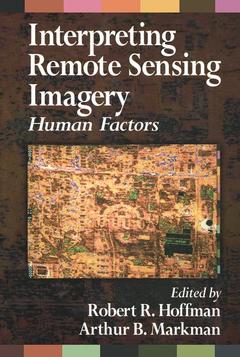Interpreting Remote Sensing Imagery Human Factors
Coordonnateurs : Hoffman Robert R., Markman Arthur B.

No matter how advanced the technology, there is always the human factor involved - the power behind the technology. Interpreting Remote Sensing Imagery: Human Factors draws together leading psychologists, remote sensing scientists, and government and industry scientists to consider the factors involved in expertise and perceptual skill.
This book covers the cognitive issues of learning, perception, and expertise, the applied issues of display design, interface design, software design, and mental workload issues, and the practitioner's issues of workstation design, human performance, and training. It tackles the intangibles of data interpretation, based on information from experts who do the job. You will learn:
Information and perception
What do experts perceive in remote sensing and cartographic displays?
Reasoning and perception
How do experts "see through" the data display to understand its meaning and significance?
Human-computer interaction
How do experts work with their displays and what happens when the "fiddle" with them?
Learning and training
What are the milestones in training development from novice to expert image interpreter?
Interpreting Remote Sensing Imagery: Human Factors breaks down the mystery of what experts do when they interpret data, how they learn, and what individual factors speed or impede training. Even more importantly, it gives you the tools to train efficiently and understand how the human factor impacts data interpretation.
Date de parution : 12-2019
15.6x23.4 cm
Date de parution : 02-2001
Ouvrage de 288 p.
15.6x23.4 cm
Thèmes d’Interpreting Remote Sensing Imagery :
Mots-clés :
Visuo Spatial; Highest Cloud Tops; human factors assessment; Meteorological Satellite Image; remote sensing image interpretation; Ridge Network; Data Set; Weather Map; Remote Sensing; Visuo Spatial Characteristics; Weather Satellite Images; Spatial Frequency; Color Fusion; PC Time Series; Meteorite Craters; Nighttime Imagery; Visual Interference; Meteorological Significance; Intermontane Basin; Single Band Images; Single Sensor Images; Microchannel Plate; Terrain Interpretation; TF; EOF; Membership Function; Perceptual Color Space



